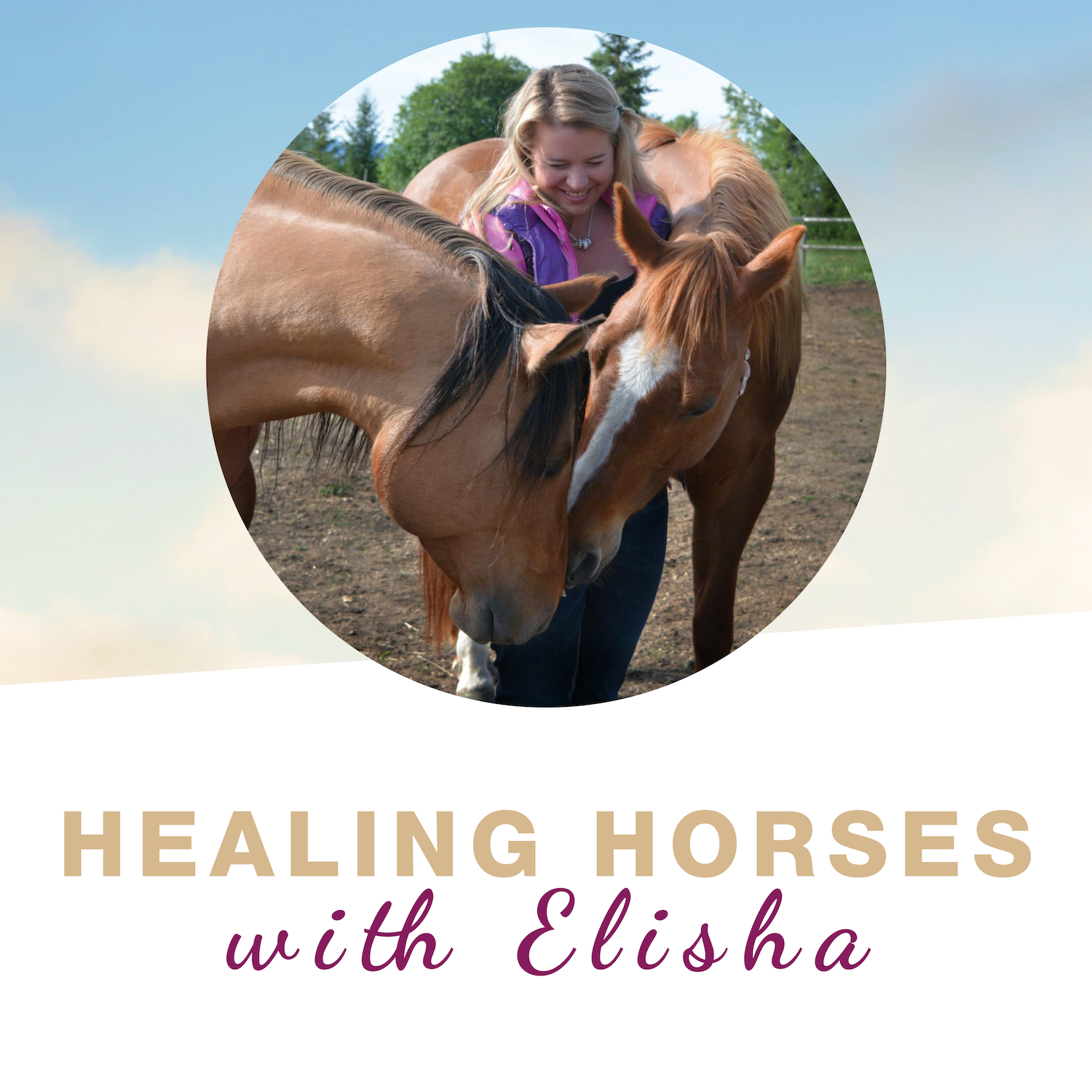Healing Horses with Elisha
A unique podcast solely dedicated to the natural horse. The information covered in each episode is based on thousands of success cases using natural health care, practical wisdom, and science. Learn what horses need to live their best lives – body, mind, and spirit – and how diet, nutritional therapy, natural remedies, and holistic horse-keeping can work for your horse on all levels. Listen in to equip yourself with the knowledge you need to make informed decisions for your horse’s health with less stress, overwhelm, and confusion.
99: The Permission You and Your Horse Have Been Waiting For
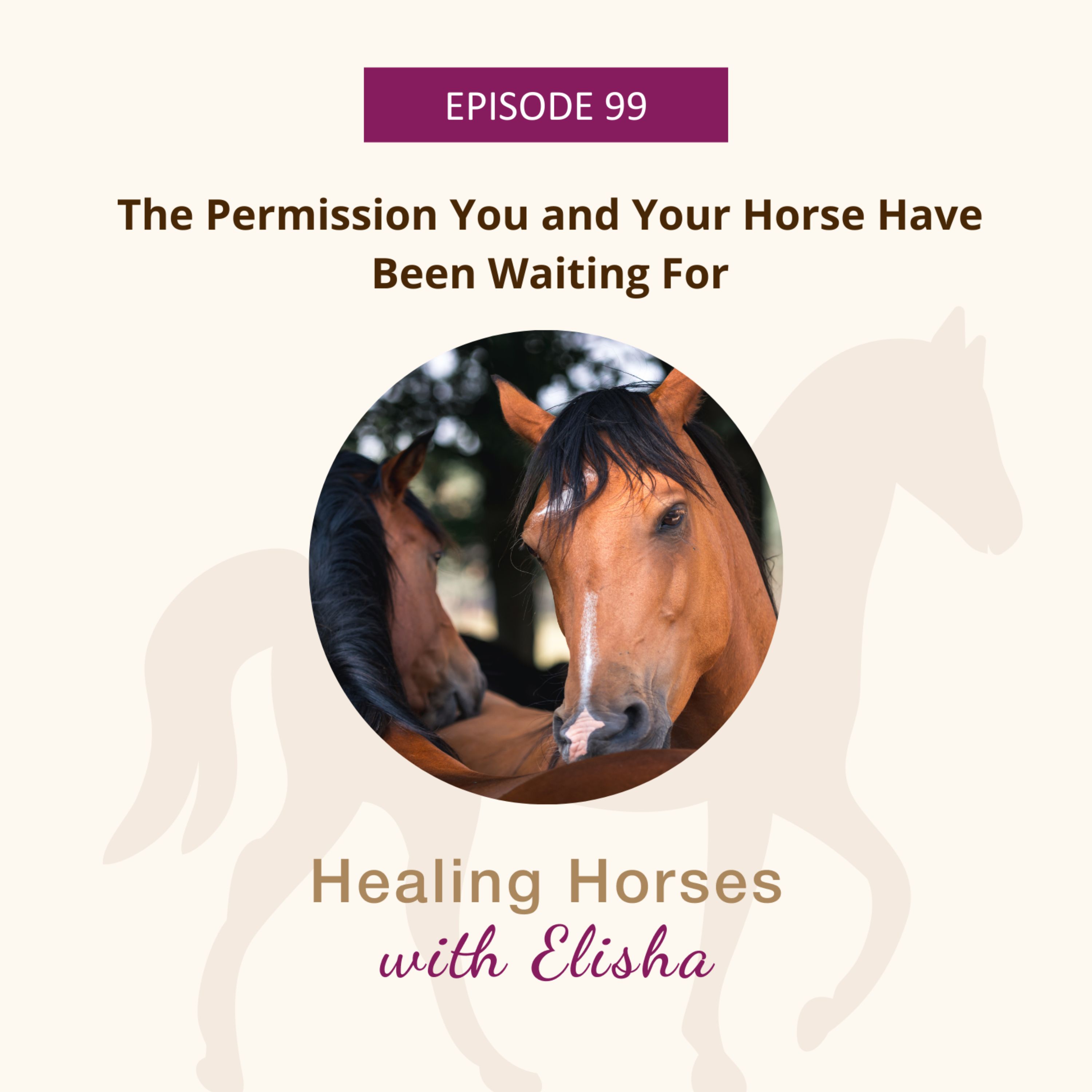
We’re talking about permission today.
In last month’s Firehorse Fierce episode, we briefly touched on permission-seeking. Today, I clarify what that really means.
Too often, we turn to another professional opinion, recommendation, or protocol before fully understanding what we are facing. The truth is, you know your horse better than anyone. So, this episode is about allowing yourself to trust what you already see in their eyes, feel in their body, and sense in their energy.
Permission Starts With You
Permission does not come from professionals, protocols, or expert opin...
98: When Knowledge Becomes Noise (And How to Filter What Actually Matters)
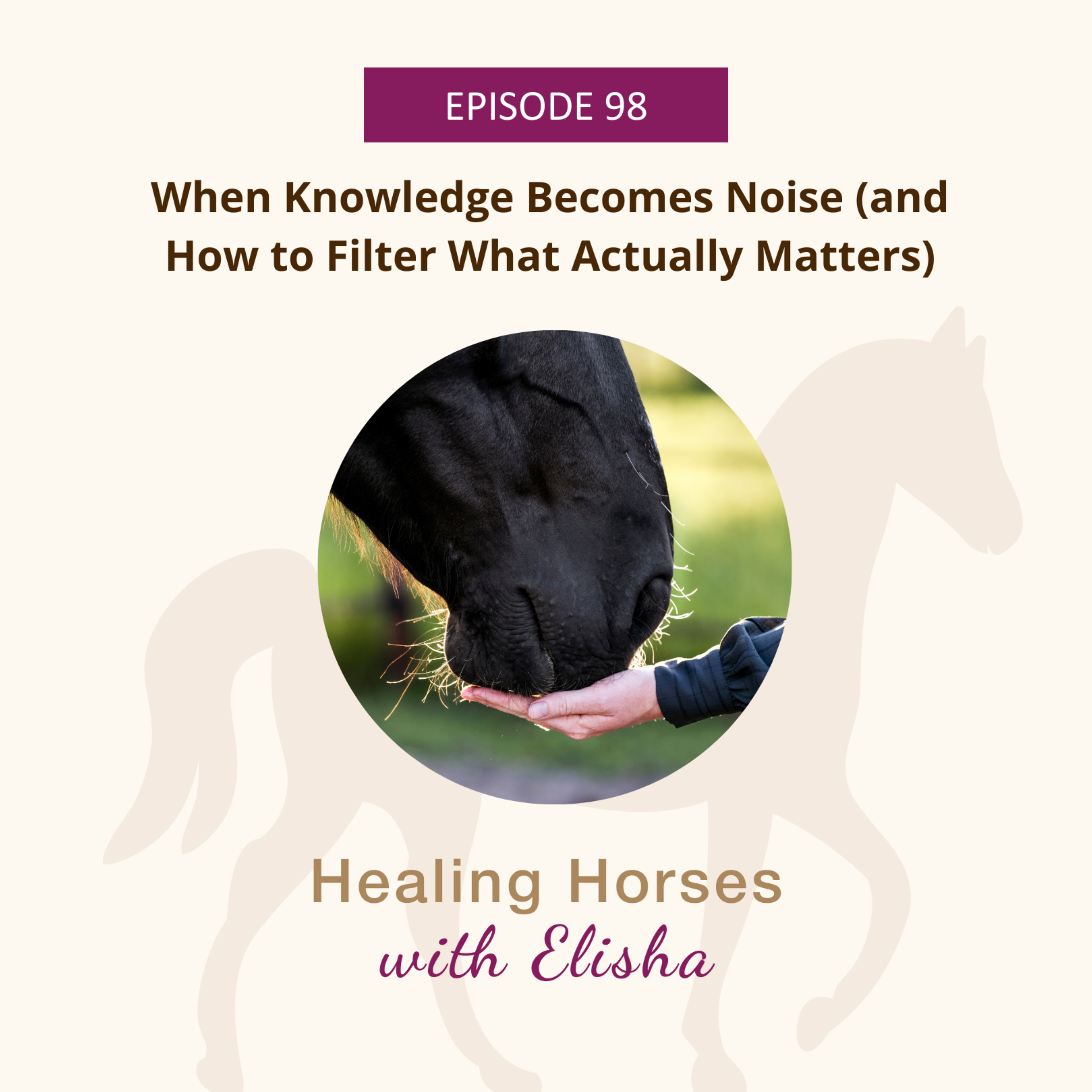
Today, we’re continuing our conversation about mindset and perspective when it comes to your horse’s health.
This year, I have received many messages about navigating information overload and conflicting advice about your horse’s health. In this episode, I focus on the vital and often missing emotional support needed for making clear, grounded decisions.
Stay tuned to learn the difference between knowledge that truly serves you and information that simply creates more noise.
When Knowledge Turns Into Anxiety
The more you try to take in, the harder it becomes to fil...
97: The Courage to Wait: When Your Horse Needs You Present, Not Panicked
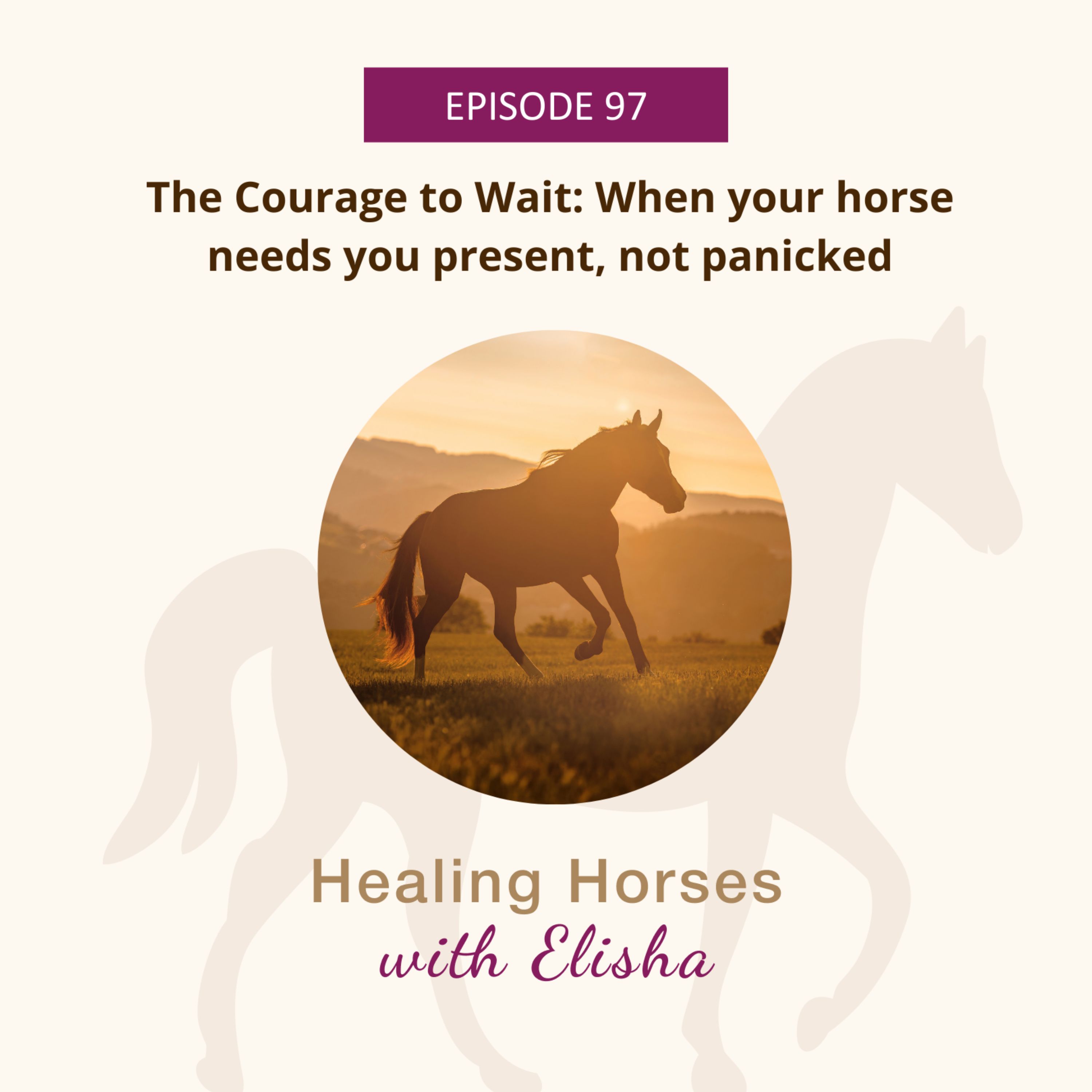
Last week, we looked at how easily our sense of urgency can spill over onto our horses. We explored ways to manage our fears and the urge to intervene when all our horses need is the time and space to heal.
Today, I take that a step further by explaining how healing is a steady, repetitive, and imperfect process that requires our trust and patience.
Imperfect Progress
Horses require consistency, observation, and time for their nervous systems to process changes. Owners often act out of fear or urgency, switching practitioners, modalities, or approaches...
96: Frozen in fear to fire horse fierce: Your 2026 transformation
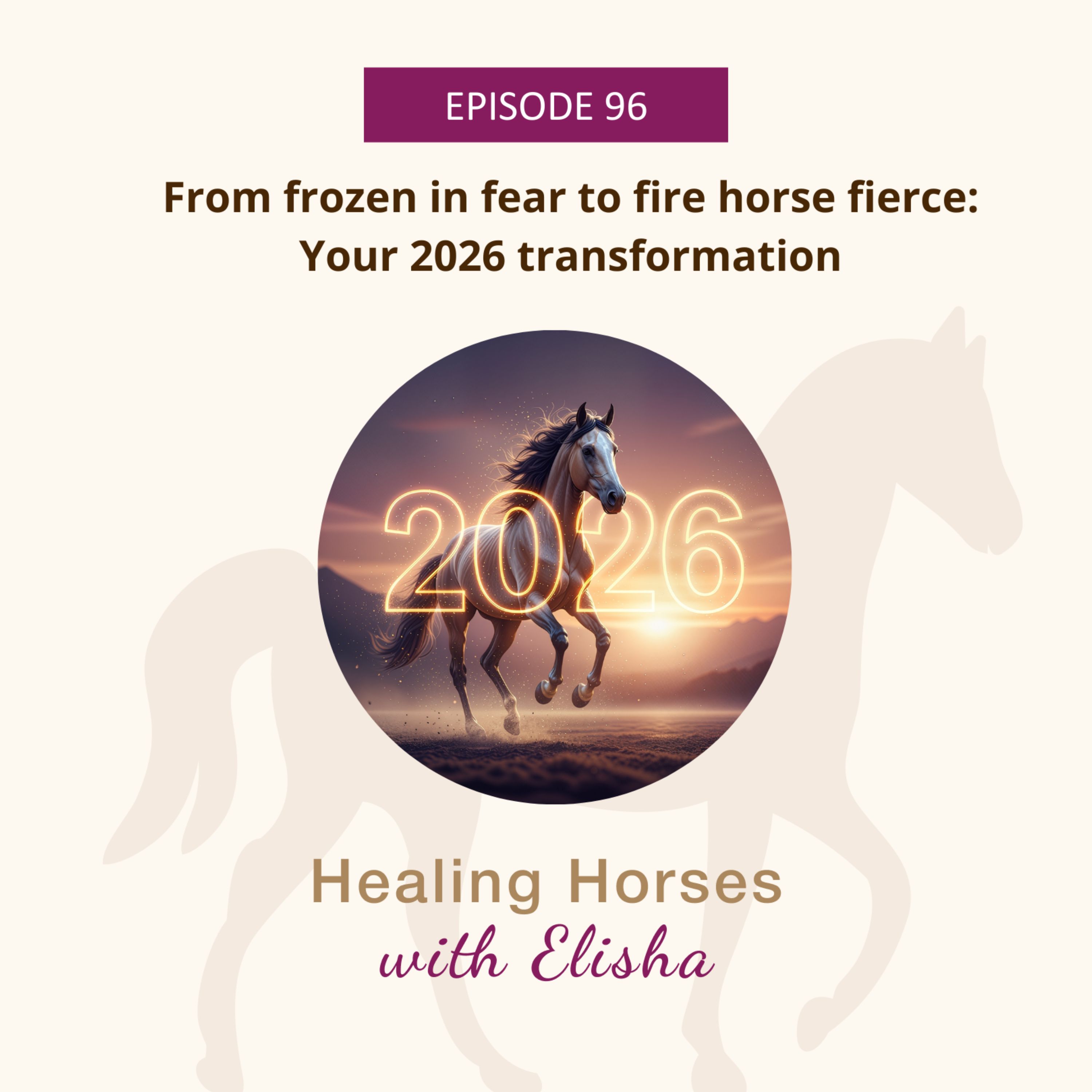
I have spent the past few weeks reflecting because the start of a new year naturally brings a desire to change what we do, how we do things, or even how we think.
If you’ve been sitting with a quiet sense that something needs to shift, for yourself or for your horse, this episode is exactly what you need to hear as we step into 2026.
Pay Attention to Your Feelings
When you sense that something is different with your horse, pay attention because it matters. A strong connection helps you notice subtle sh...
95: Learn More About My Signature Program: Healing Horses Their Way

Every year, from late November to early December, we roll up our sleeves, set the dates, map out the plan, and fine-tune the details for the year ahead.
Join me today for an exclusive behind-the-scenes look at how we structure the program, what you will learn, the rollout date, and all the incredible benefits you can expect!
Overview of the Program
This signature program has been a favorite among horse owners and practitioners since it launched in 2018. It has been designed to give you a strong foundation in holistic horse care and is...
94: Detox Done Right: Your 3-Step Supplement Audit
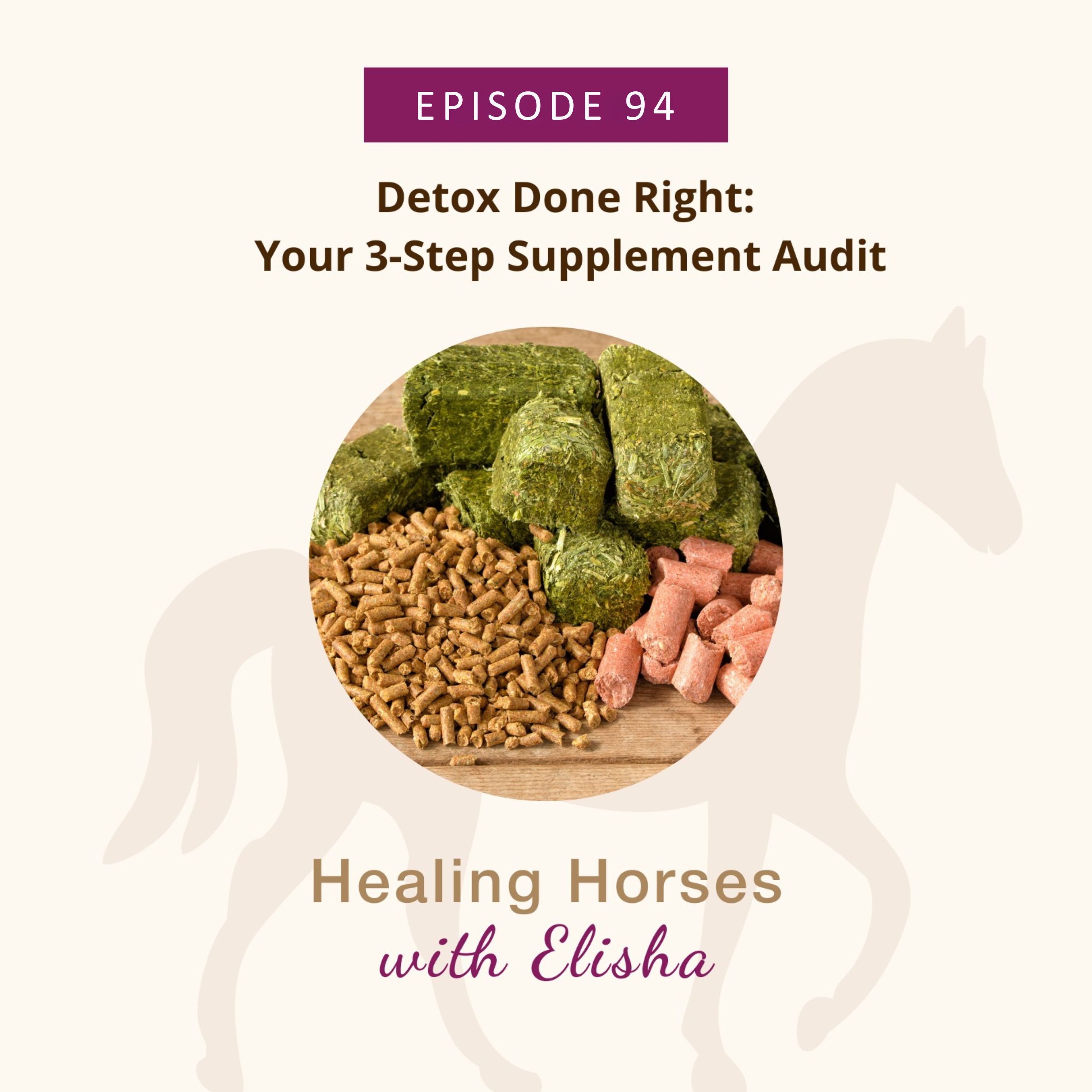
This week, we are continuing with the theme of toxicity because it lies at the root of most health issues horses experience.
Looking back at past cases, the pattern is unmistakable. Once you remove those dietary toxins, things start to turn around. The tricky part is knowing what is helpful and what is harmful, so that is what we are focusing on today.
Over-Supplemented
Over-supplementation becomes a major contributor to malabsorption, inflammation, and chronic health problems. Many ingredients, especially synthetic, inflammatory, or poorly absorbed ones, cause toxicity, overwhelm digestion, and suppress the immune...
93: The Insulin–Inflammation Cycle: How It Becomes Toxic and How to Break It

Much of what we read online about horse health is misleading. So, for those of you following a more natural and holistic path by focusing on the diet, lifestyle, and environment of your horses before turning to drugs or surgery, having the correct understanding is essential. I hope that each episode helps you view conditions like insulin resistance, equine metabolic syndrome, and laminitis with clearer eyes and more confidence.
Today, we are exploring insulin, what happens when it stays high for too long, why it becomes toxic in the body, and how this links to metabolic dysfunction...
92: The Definition of Toxicity and What it Means for Your Horse (Spotlight Rerun)
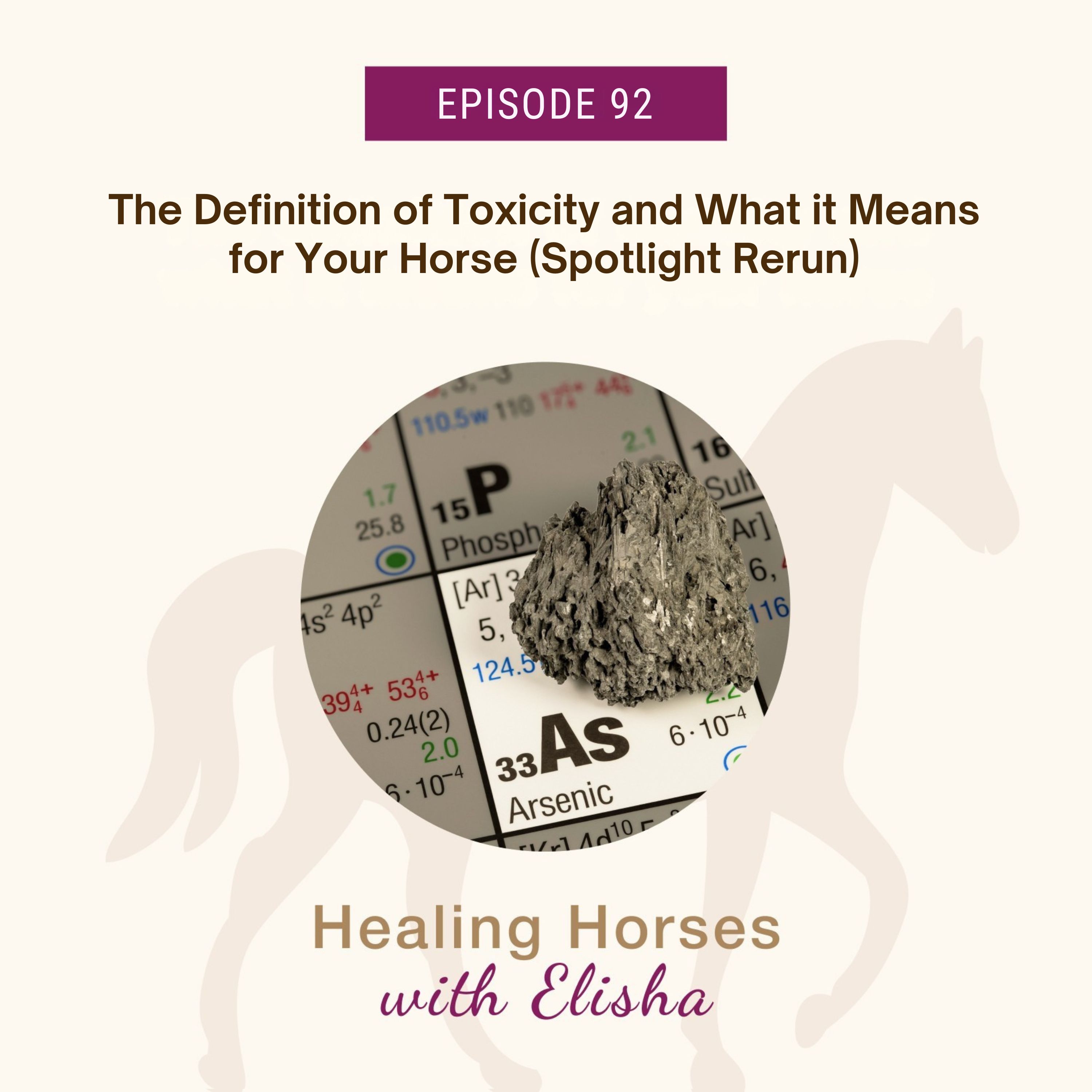
Last week, we explored the early signs of toxicity in horses. Today, we revisit a previous episode to clarify what toxicity is and how it affects your horse.
Toxicity is one of the leading causes of equine disease. When the toxic load of horses exceeds what they can process, it becomes hard for their tissues to remain healthy, their organs to function as they should, and their body systems to work together to sustain good health.
Today, I scratch the surface of the vast and complex topic of toxicity, giving you a little food for t...
91: Early Warning Signs of Toxicity: What Your Horse is Trying to Tell You
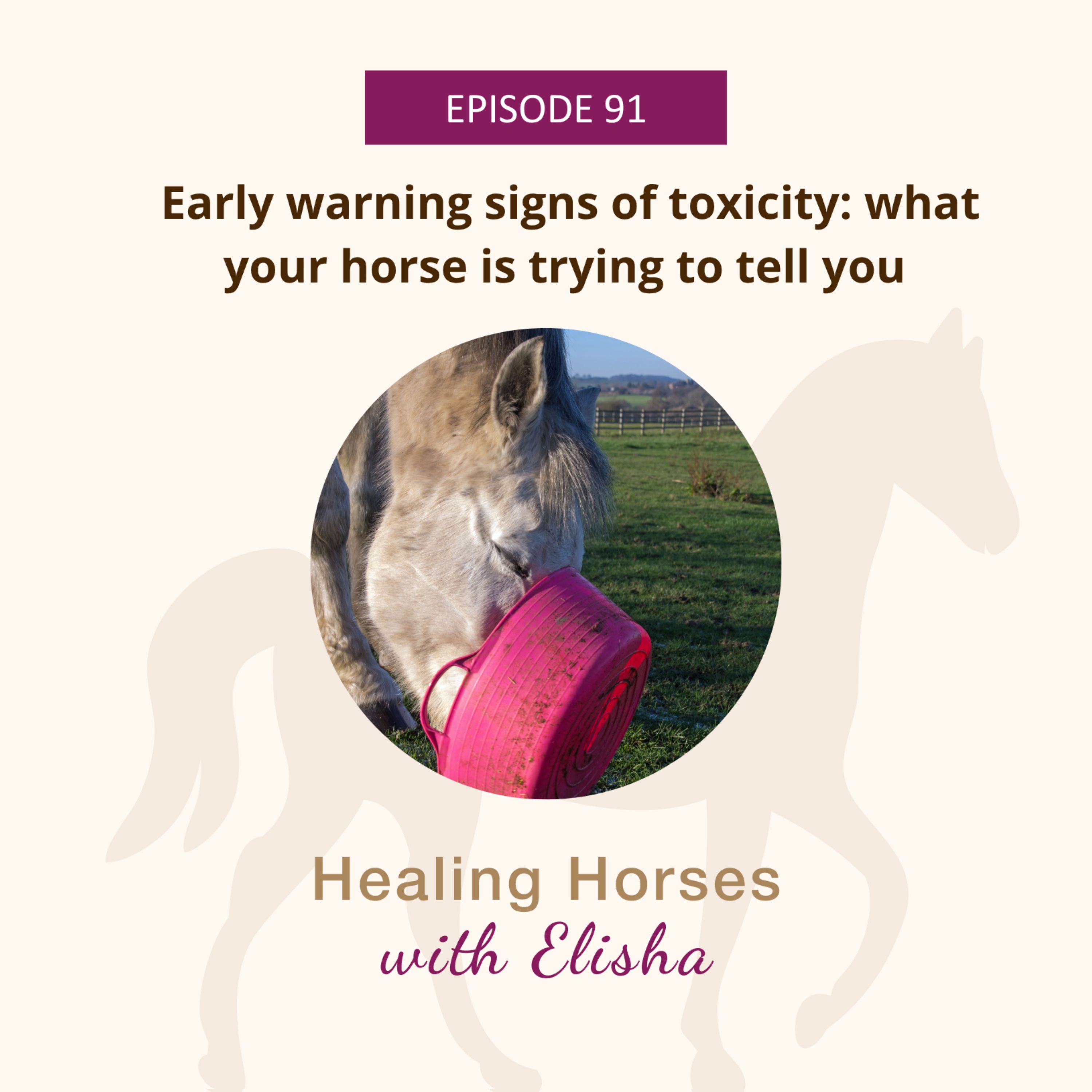
We’re talking about toxicity today.
I’ve been seeing several cases lately where toxicity plays a role, so I thought it was time to revisit the topic. In episode 53, I covered the definition of toxicity and what it means for your horse, so you can go back and listen to it after this episode for more details.
Stay tuned as I share the signs to look out for.
Understanding Toxicity in Horses
Toxicity in horses often develops slowly and subtly through accumulated exposure to feed contaminants, environmental chemicals, medications, or poor...
90: Winter Nutrition Tips for Keeping Your Horses Healthy
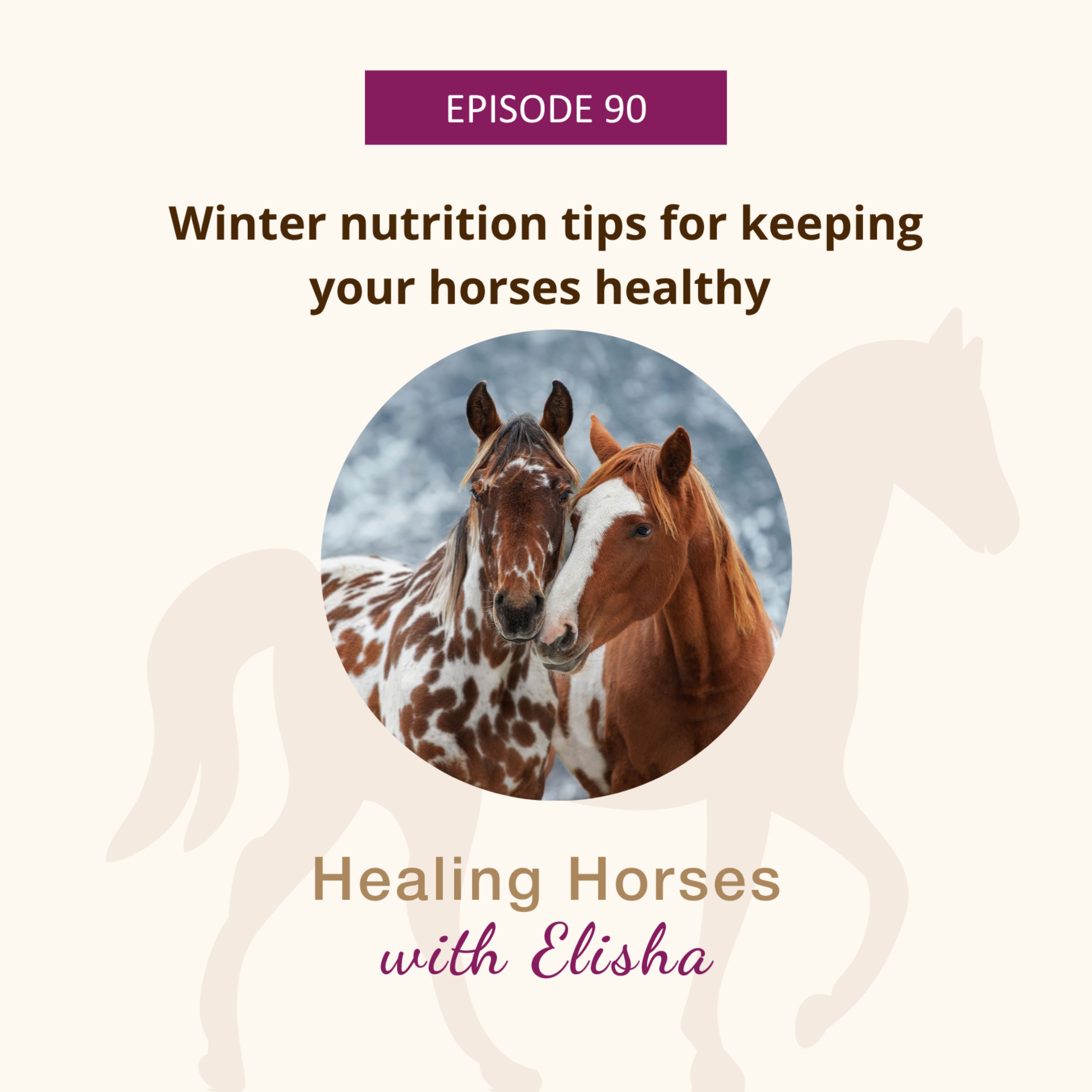
Today I’m sharing winter nutrition tips for horses.
As temperatures drop and the seasons shift, you will need to adjust your feeding to support your horse’s health through the colder months. I’m in Calgary, Alberta, where we experience extreme temperature swings. Wherever you live, the degree of cold you experience will influence how you should feed your horses for optimal health, and one of the most important factors to consider is your horse’s weight regulation.
Managing Weight in Winter
Winter poses challenges for both easy and hard keepers. Easy keepers o...
89: Is Your Horse Eating Dirt?
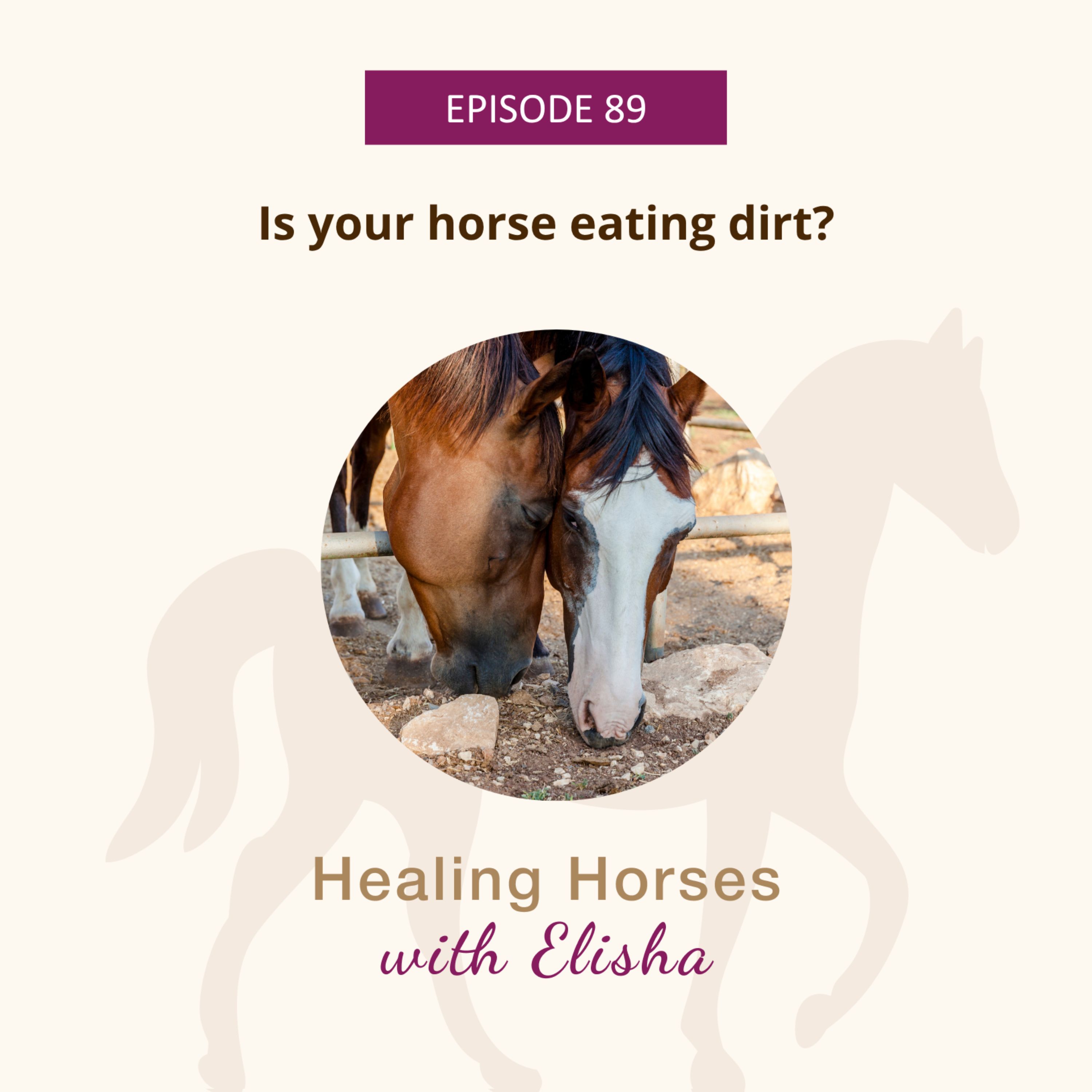
This week, we’re tackling a question horse owners often ask, which is why their horses eat dirt.
Some horses only lick or nibble dirt occasionally, while others take it to extremes, even digging holes in their paddocks. The term for this behavior is geophagia, or pica, which in humans means eating things with little or no nutritional value. In horses, that behavior always points to an underlying cause that owners must explore.
Why Horses Eat Dirt
Horses that eat dirt are not just engaging in random behavior. They are seeking to soothe dis...
88: Tips for Easier Mash Prep
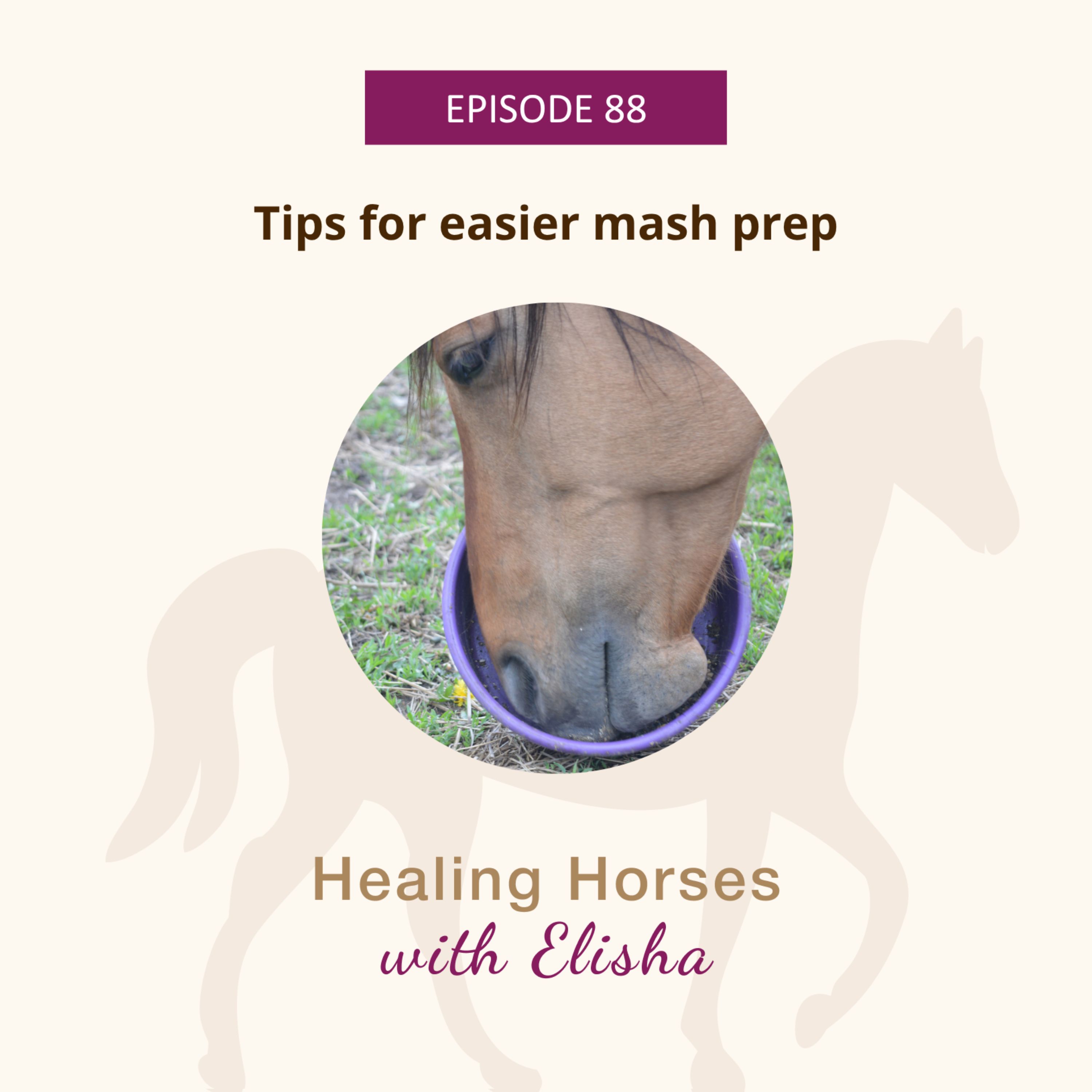
With winter just around the corner, I decided to offer some tips today, for preparing mash in the colder months.
Stay tuned for practical tips to make soaking and preparing mash far easier- not only in winter, but throughout the year.
Keep Mash Prep Simple
Keep mash prep simple by using single, whole ingredients rather than mixed commercial feeds full of synthetics and fillers. This approach supports recovery and makes year-round feeding easier.
Soaking Cubes and Beet Pulp
Always soak cubes or alfalfa to prevent choking and improve digestibility...
87: Disease Labels and How They Shape Our Beliefs
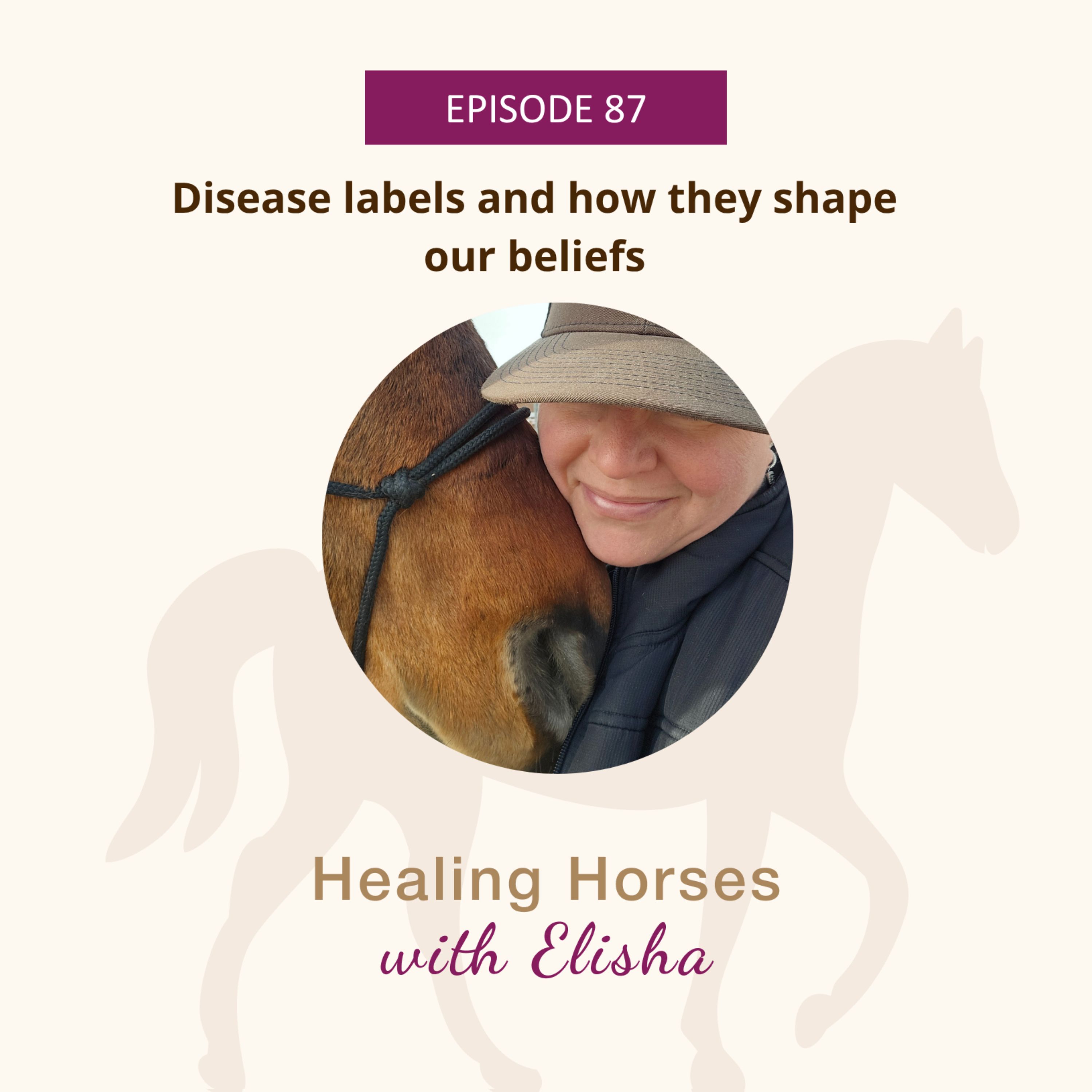
Today, we are exploring how our mindset can influence the decisions we make about challenges to our horses’ health.
Whether you are dealing with a common issue or a new diagnosis that feels overwhelming, it is essential to stay grounded in practical knowledge and clear reasoning rather than emotion because disease labels can sometimes influence our perspective and choices in ways that do not serve the best interests of the horse.
What Disease Labels Really Mean
Disease labels are clinical tools that help classify health problems in horses, based on their blood tests, sy...
86: How Fall Hormone Changes Can Affect Your Horse's Metabolic Health
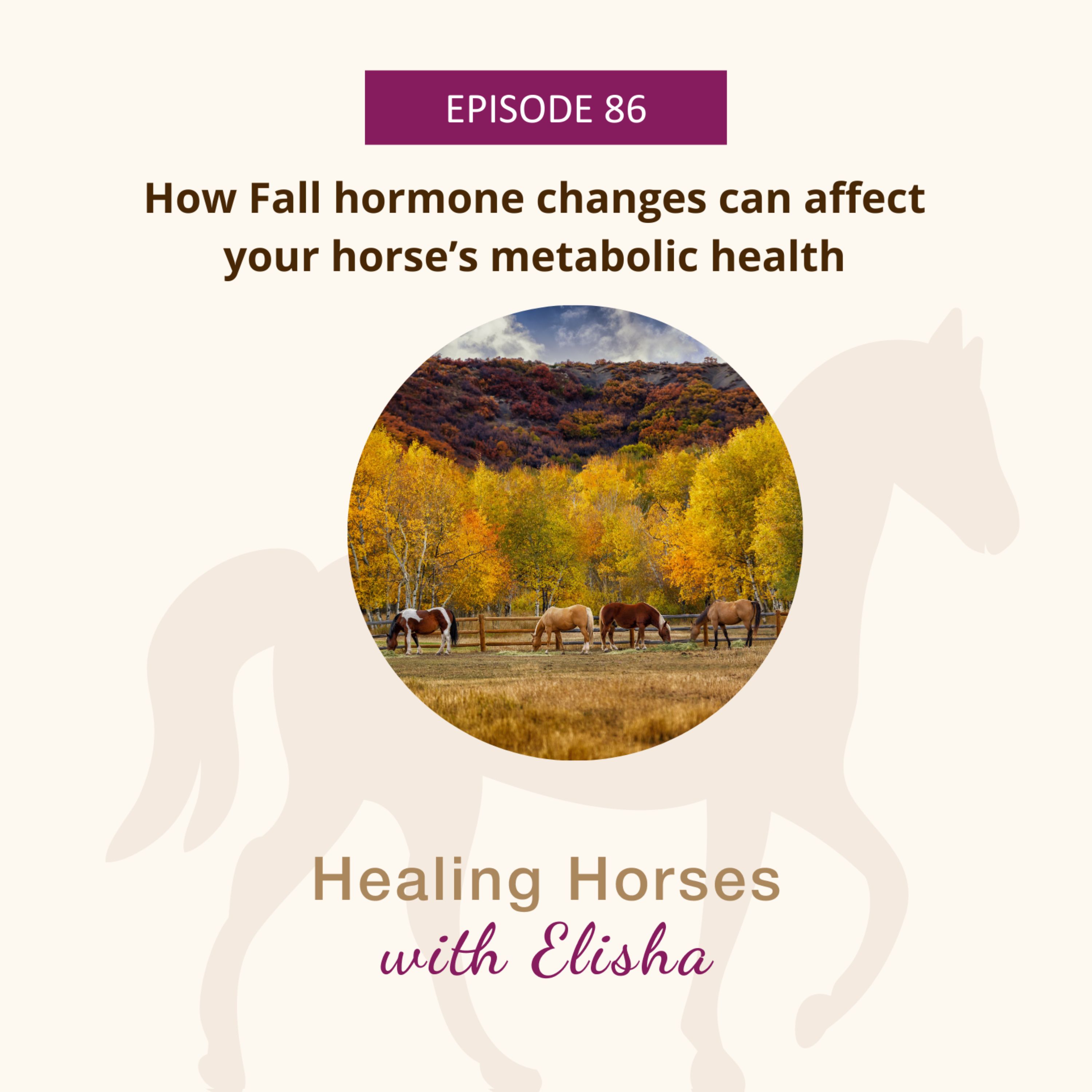
As we move from summer to fall, and temperatures at night start to cool, subtle changes begin to occur in our horses.
Shorter days trigger powerful hormonal shifts, often before we even notice. Those shifts play an essential role in the health of our horses- especially those with metabolic conditions.
Hormone Shifts and Metabolism
Seasonal hormone shifts influence how horses process sugar, maintain muscle, and manage inflammation. In fall, ACTH levels naturally rise, increasing cortisol to drive fat storage and coat growth in preparation for winter. When those hormones remain elevated for too l...
85: Skin Problems and Horses: What You Need to Know
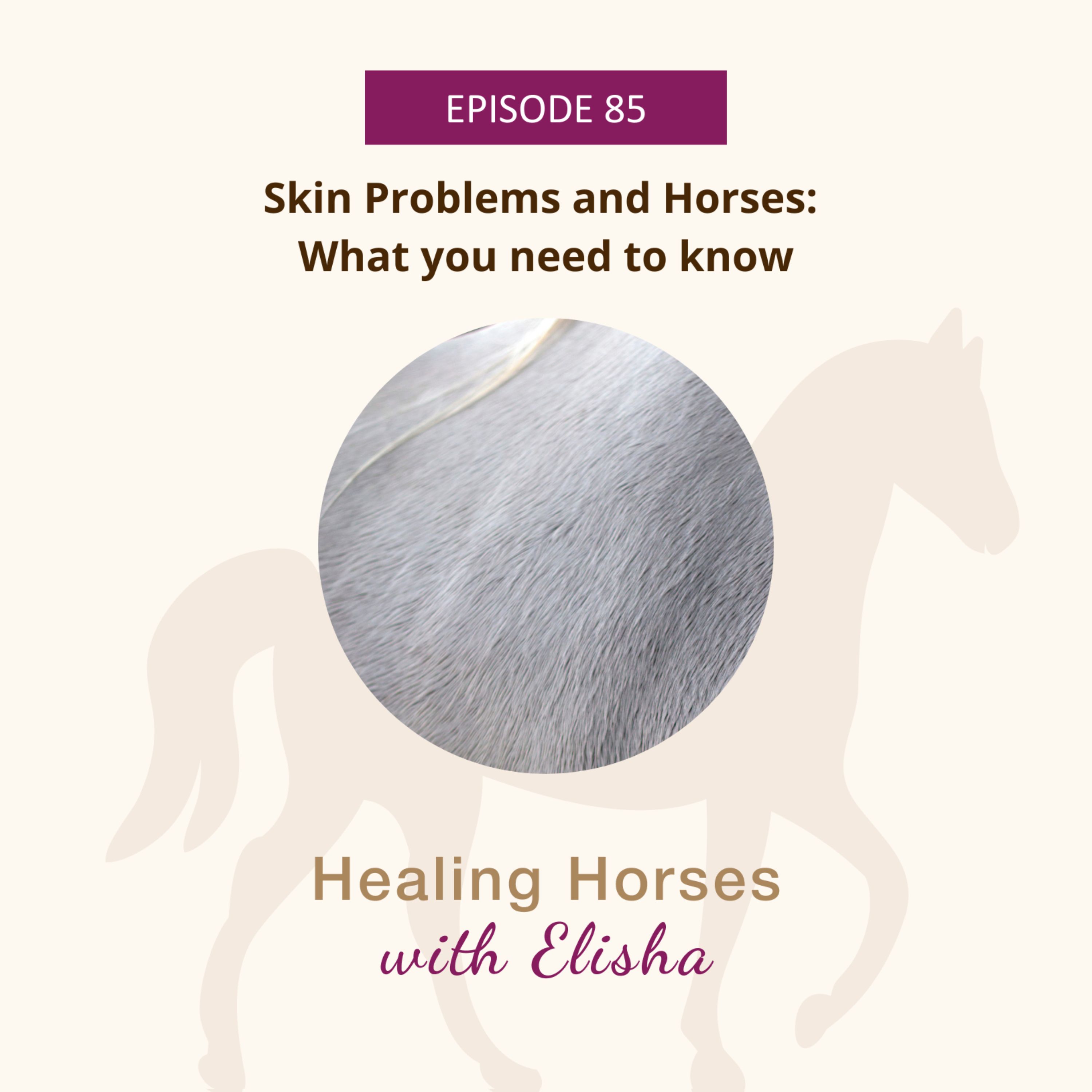
This week, we are diving into skin problems with horses.
Skin problems are hard to ignore. They are right in your face, so they grab your attention instantly.
Types of Skin Problems in Horses
Skin issues range from dry, flaky skin to severe allergic reactions. Horses may suffer from hives, sweet itch, infections like rain rot or mud fever, and chronic itchy skin. These conditions may appear as sudden, alarming outbreaks or develop into persistent, long-term struggles.
Why Skin Problems Demand Attention
Unlike hidden health issues, skin problems are vi...
84: The Equine Thyroid Gland and its Role in Metabolic Health
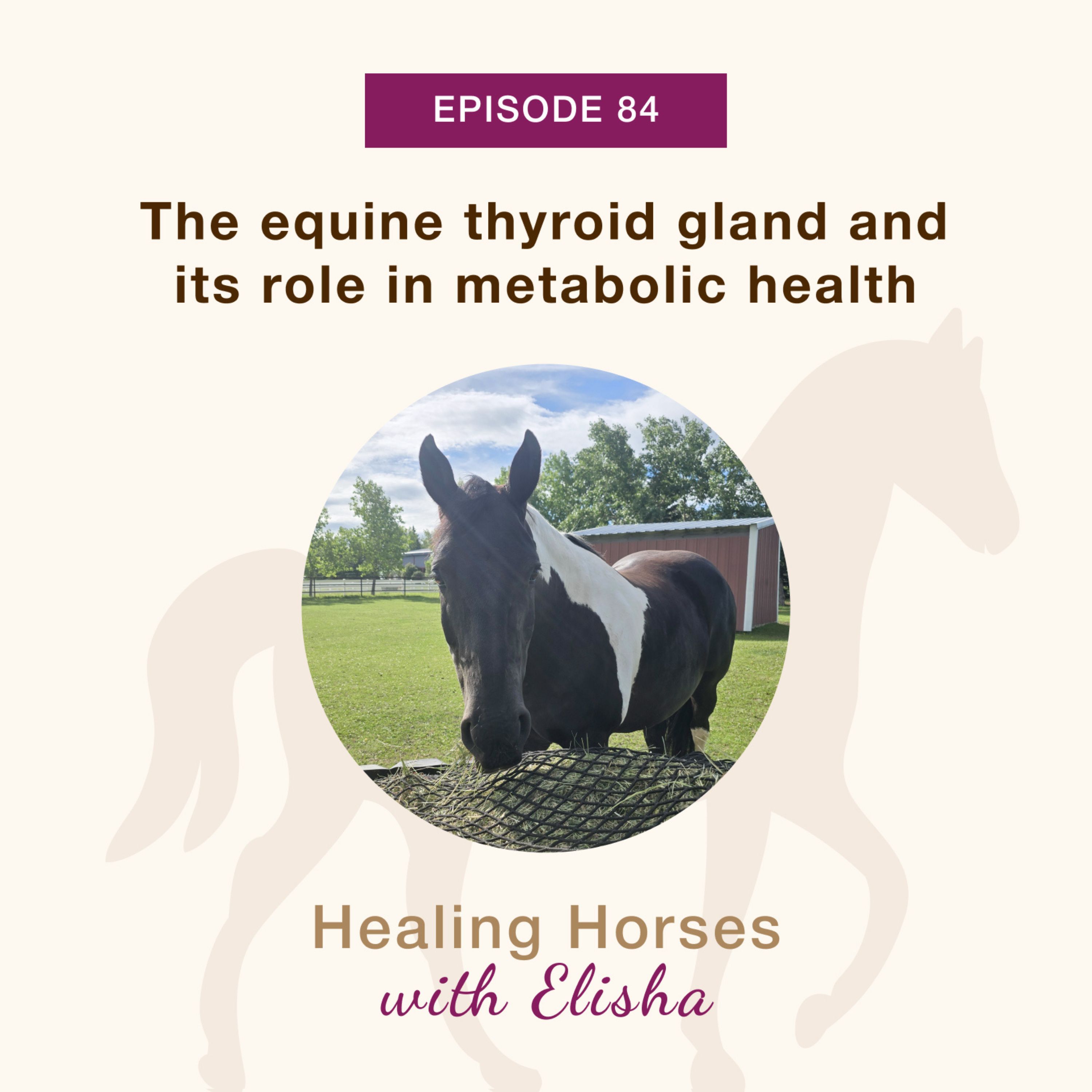
The thyroid gland plays a crucial role in the metabolic health and overall vitality of horses, yet it is often overlooked or treated only when serious problems arise.
Understanding the role of the thyroid gland and the factors that support or hinder it is the key to long-term equine wellness. Remember that supporting your horse’s health holistically always begins with their diet, lifestyle, and stress reduction.
Recognizing Thyroid Imbalance
Changes in the coat are often the first visible sign of thyroid imbalance. Horses may develop coarse or dry hair, experience hair loss, shed slowl...
83: How to Set Expectations for your Horse's Health Journey (Re-run Spotlight)
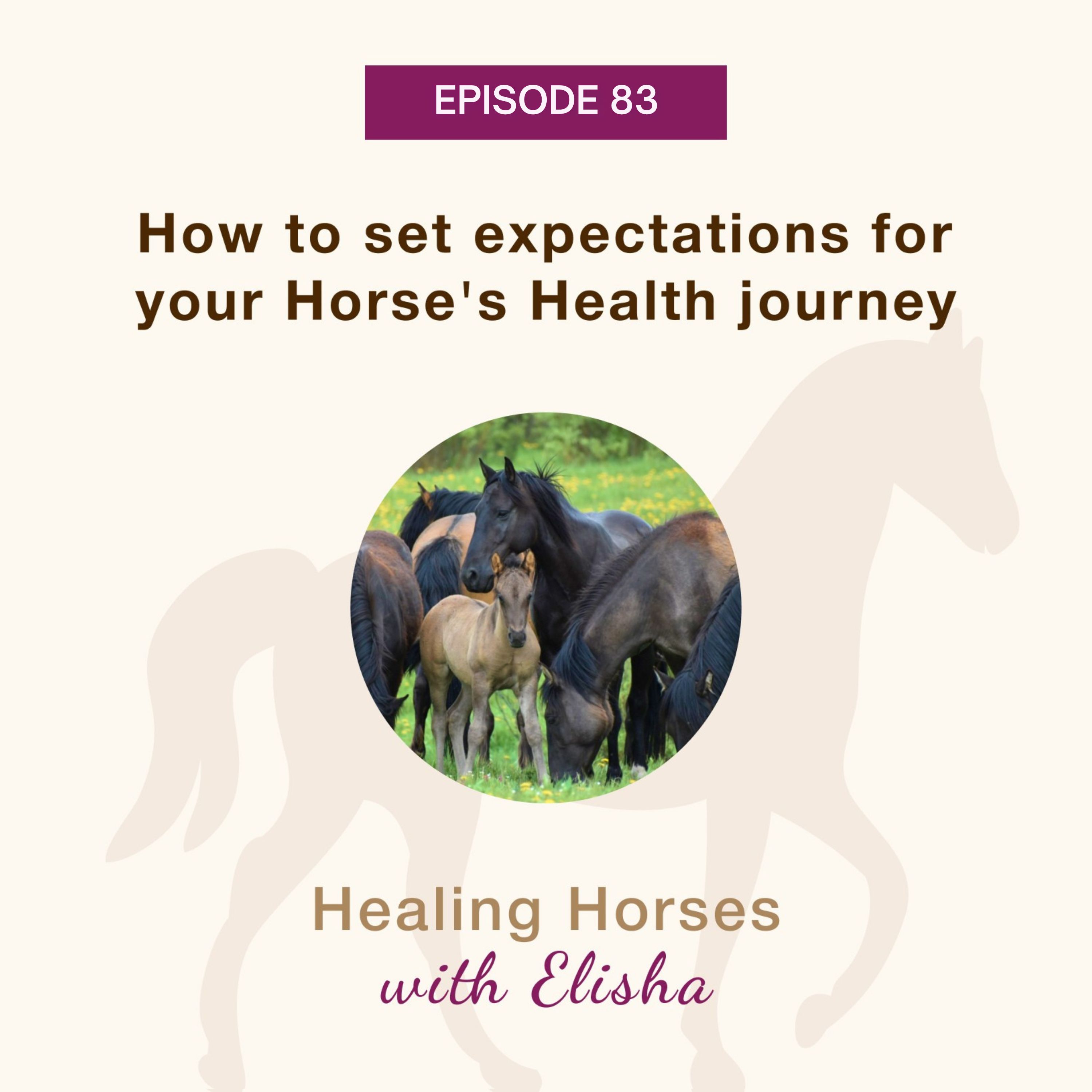
In Episode 13 last year, I covered some of what I discussed in my free webinar series, Become Your Horse’s Healer.
We have a replay of that episode today, so tune in to learn how to reset your expectations for your horse’s health.
Understanding Healing Patterns
Horses usually respond to healing programs in four different ways. Some horses respond positively to a new program and show rapid improvement. Others experience a temporary worsening of their conditions as their bodies start the healing process, often marked by fatigue or increased inflammation. Some horses show...
82: Your horse's 10 Symptom Checklist for Equine Metabolic Syndrome (EMS)

This week, we are revisiting the topics of insulin resistance and equine metabolic syndrome (EMS).
Those issues have been on my mind recently due to the many questions I have received, and because I am currently working on a project with an insulin-resistant mare that is struggling to make any progress at the facility I manage.
Join me as I share my insights on how these recoveries typically unfold.
Act Early and Monitor Progress
Recognize any changes in your horse before they become serious problems. Prevention is always the key, as...
81: How Much Should My Horse Be Eating?

Today, we are focusing on how much a horse should eat.
Horses should not eat continuously, but determining the right amount of food and finding the right balance between enough and too much can be complicated, particularly for horses with insulin resistance or metabolic issues.
Metabolic and Insulin-Resistant Horses
Feeding horses with metabolic issues and insulin-resistance the correct amount can often be the missing piece once their exercise and nutrition are optimized. Some horses can self-regulate easily, while others need careful management to avoid overeating.
Feeding the Right Amount of Hay<...
80: The Concept of "Minimum Effective Dose" Applied to Therapeutic Nutrition for Horses
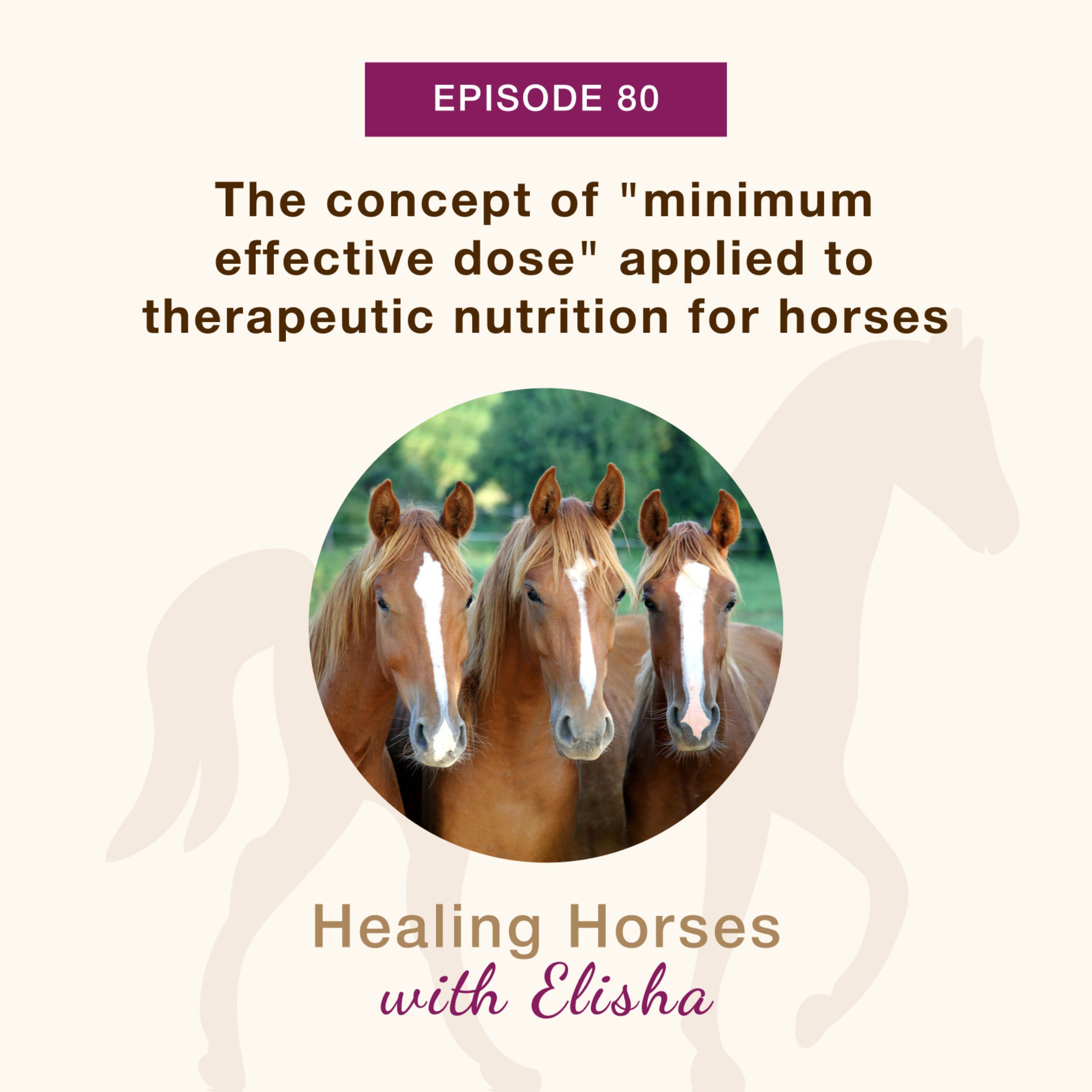
This week, we are focusing on dosing.
In this episode, I explain the concept of the minimum effective dose, which is the smallest dosage required for the body to respond to or benefit from. The same principle applies to horses when adjusting their nutrition or adding supplements. The aim is to provide just enough to see a positive response, without going so far that it causes unwanted or harmful effects.
Dosing Principles
In pharmacology, the ideal dosing range lies between the minimum effective dose and the maximum tolerated dose. That principle also applies t...
79: Glucosamine as a Joint Supplement for Horses: Too Good to be True?
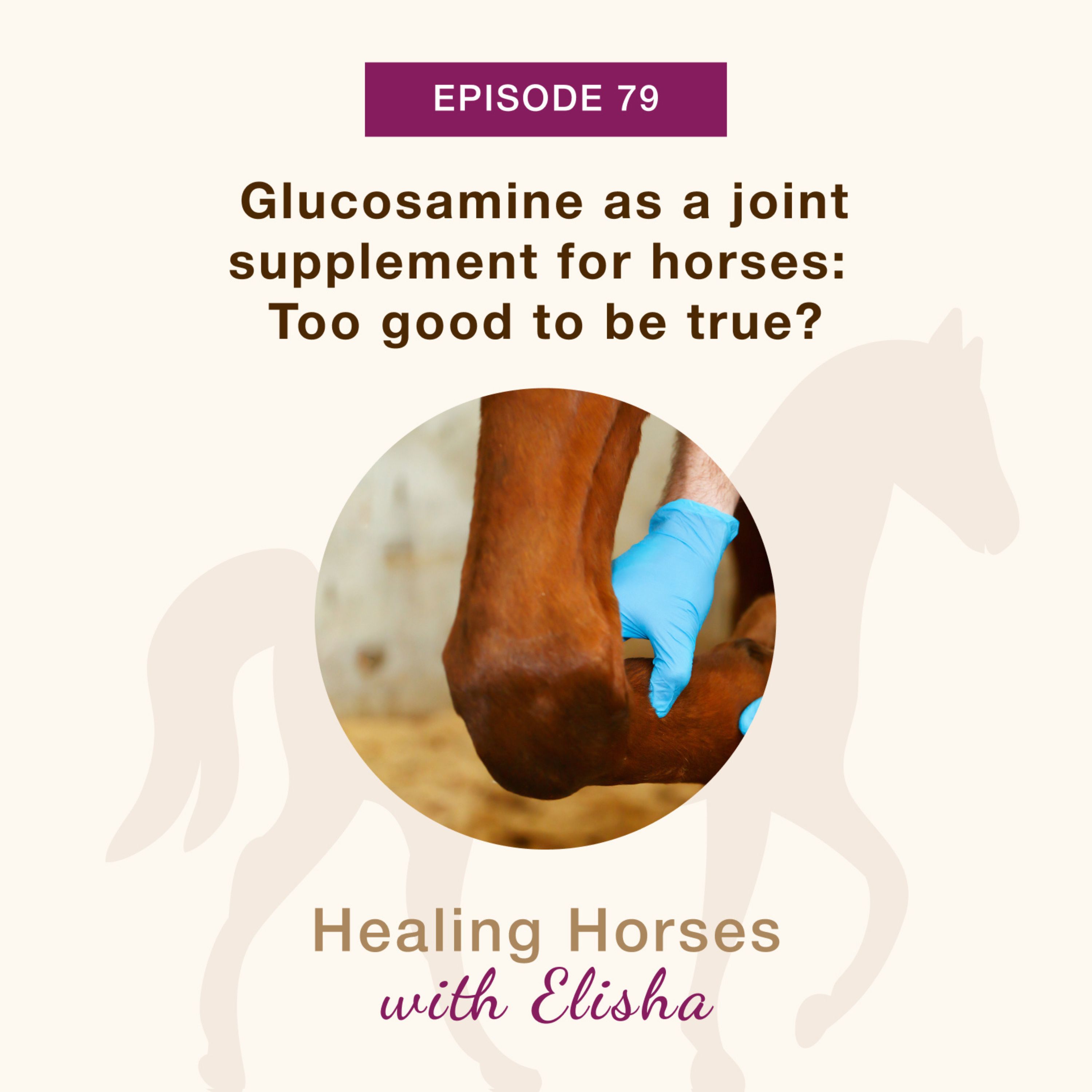
We are exploring glucosamine today.
About a decade ago, glucosamine was marketed and sold as a joint supplement for horses. It is still available for joint support in dogs and humans, but seldom as a supplement for horses.
In this episode, I discuss my experience with glucosamine, sharing its origin and clarifying some of the holistic principles it breaks.
Nutrients vs. Nutraceuticals
Nutrients are the vitamins, minerals, and essential fatty acids that are essential for life and must come from food. Glucosamine is a nutraceutical, a non-essential compound found naturally in c...
78: 3 Foods to Avoid for Better Horse Health (Rerun Spotlight)

Today, we cover three foods to avoid for better horse health. This topic ties into our last discussion, where we explored toxicity in horses and how accumulated toxins can build up over time and lead to serious health issues.
Sources of Toxicity in Horses
Horses get exposed to various sources of toxicity, mainly through chemicals and preservatives in their food and water, medications, vaccinations, and deworming agents. Over time, the toxins build up and can overwhelm the immune system, leading to chronic health issues like inflammation, allergies, and sensitivities. Addressing the diet and removing toxic...
77: Laminitis From a Hoof Care Provider's Perspective with Jessica Fobert
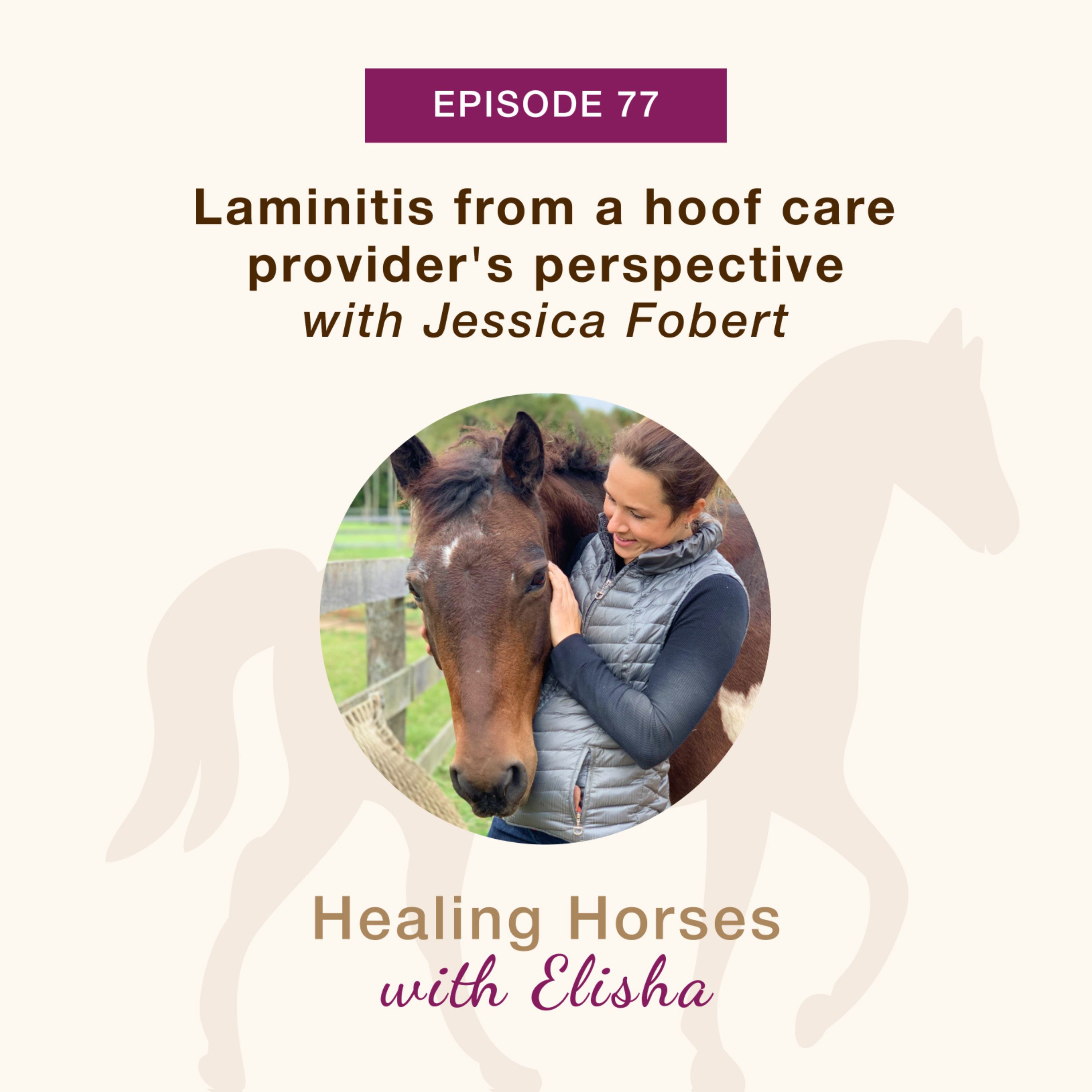
I am excited to welcome Jessica Fobert as my guest today!
Over the past decade, Jessica and I have worked together on many challenging cases, and I have come to value her input as a trusted second opinion for my clients. She is a hoof care practitioner and lifelong horse lover, registered with both the Canadian Equine Hoof Care Association and Progressive Hoof Care Practitioners. She and her business partner, Natalie, run a rehab facility in Toddham, Ontario, where they take on the toughest of cases.
Join us as Jessica dives into the critical work s...
76: Sugar isn't the only cause of laminitis - here are some others

This week, we explore some key contributors to laminitis, other than grass, that every horse owner should be aware of.
In the last episode, we discussed sugar-induced laminitis and why spring grass can be a big concern for many horse owners. However, sugar is not the only factor that can trigger laminitis, and owners need to understand the broader range of potential causes.
A Whole-Body Issue
Laminitis is inflammation of the lamina. It is often a reflection of systemic inflammation and not just a foot problem. Inflammation, especially when chronic, can damage tissues...
75: 3-Step Action Plan for Sugar-induced Laminitis

Today, we are tackling the topic of laminitis and exploring those early-stage situations where your horse begins to show signs of soreness and tenderness.
What we focus on today does not include the more mechanical cases of founder laminitis but rather horses that tend to become sugar-sensitive as the grass begins to turn green in spring.
Recognizing Sugar Sensitivity in Horses
Some horses become sore or tender as soon as lush spring grass appears. It is often due to sugar sensitivity, and these horses may also be insulin resistant. Insulin resistance can present as...
74: Chamomile for Horses: Common Uses and Health Benefits

The symptoms most horses experience from digestive issues and anxiety tend to cause them lots of discomfort. Fortunately, there is a wonderful plant horse owners can use to manage those conditions.
Chamomile is a versatile herb with a wide range of uses for horses. It has a calming energy and a pleasant smell, and horses love it!
The Link Between Digestion and Anxiety
There is a close connection between digestion and anxiety in horses. Stressful events like separation or fear can trigger digestive issues such as colic or ulcers. Those two systems work in...
73: Would your horse like a salad on the menu?

This week, our focus returns to the equine diet.
Whether you are supporting overall health or addressing a particular issue in a horse, it always starts with their food. That often means identifying and removing dietary intolerances or introducing an anti-inflammatory or alkaline diet.
Since each horse has a unique constitution, their diets must be individualized to support their specific sensitivities.
Fresh Fruits and Vegetables for Horses
Offer a variety of fresh produce like melons, shredded beets, cucumbers, watermelon rind, apples, blueberries, and carrots. Chop them into small pieces for easy e...
72: 5 Ways to Keep Your Horses, Ponies, and Minis Moving this Spring

June has arrived, and everything is turning green again. With no more mud and ice around, it becomes much easier for horse owners living in wet and snowy areas to get their horses moving as they should once more.
This week, I share some tips to get your horse moving in spring, which is particularly important if your horse is on grass, with few other options.
Movement Matters
Spring and summer grasses are rich in sugars, which can be risky for horses with metabolic issues like insulin resistance or laminitis. Supplements may help m...
71: Equine Sarcoids: The Holistic Approach

This week, we are taking a closer look at equine sarcoids.
Equine sarcoids are a common issue that can be concerning for horse owners. These skin growths are neither serious nor life-threatening, but they can be unsightly and sometimes tricky to manage. They tend to vary in appearance and location, and in some cases, can go unnoticed until they become more visibly pronounced.
What Are Equine Sarcoids?
Sarcoids are skin tumors that account for 36 to 40% of equine tumors. They can be flat, raised, crusty, weepy, or ulcerated, and can grow and spread at d...
70: Antioxidants to Consider for Horses with Poor Eye Health

This week, we continue where we left off last week, exploring equine eye conditions through a holistic lens.
A holistic approach focuses primarily on optimizing the diet and lifestyle of horses, providing everything they need to support their overall health and maintain healthy eyes.
Long-Term Health Issues Often Begin with Deficiencies
Chronic deficiencies, prolonged stress, and toxin exposure are often the root causes of long-term health issues in horses. Those problems develop slowly, sometimes taking years to show symptoms. Even though genetics may be an underlying factor, nutrition is crucial in determining health...
69: Conditions of the Equine Eye from a Holistic Perspective

This week, we are focusing on eye health in horses.
Eye conditions consistently rank among the most common and concerning issues reported by horse owners. With vision being such a crucial aspect of the well-being and safety of horses, owners must gain a holistic understanding of equine eye conditions and learn how to manage them responsibly and effectively.
Why Eye Issues Matter
Eye problems in horses are often a clue pointing to deeper health issues. Symptoms like weepy eyes, swelling, or more serious conditions like uveitis and conjunctivitis sometimes show up alongside other...
68: The Dos and Don'ts of Soaking Hay for Your Horse

This week, we are following up on our last discussion about sourcing the right hay for your horse by focusing on the practice of soaking hay.
Soaking hay is a common strategy for reducing sugar levels for sugar-sensitive horses. This practice is helpful for horses with insulin resistance, acute laminitis, or high-insulin PSSM.
Join us to learn how to soak hay to improve your horse's health and ensure longevity while avoiding the associated risks.
When and Why to Soak Hay
Soaking hay can be helpful, but it should only be done wh...
67: How to Source Hay That's Right for Your Horse

Today, we tackle hay, an essential yet often overlooked component of an equine diet.
Hay provides most of the calories and nutrition horses need, especially in colder climates. However, it is not always the first place we look when issues arise. Since hay is dried grass with less nutritional value than natural forage, it is not a perfect food, yet it is what most horse owners must rely on. The quality of the hay, the treatments it has undergone, and how it affects your horse are critical factors to consider. That is why it is best to...
66: Worried about putting your horse on grass? Here are Some Tips for Prevention for More Sugar-Sensitive Horses

As spring approaches, many horse owners become concerned about what the grass returning could mean for their more sugar-sensitive horses, as those horses usually have a history of metabolic syndrome, insulin resistance, PPID, PSSM, laminitis, and hoof problems.
Managing sugar intake and keeping their hooves healthy is the key to avoiding serious setbacks in sugar-sensitive horses. So, in this episode, I share some simple and effective strategies for supporting horses and managing their sugar levels as they go back onto grass.
Supporting the Transition to Grass
Spring grass can be challenging for horses...
65: 7 Parasite Pointers That Every Horse Owner Should Know

Today, we share seven key pointers to help you, as a horse owner, plan a parasite control program for your horse.
In this episode, you will learn how to formulate a parasite program and how to prepare your horse for it. We will also explain how to schedule your program effectively and responsibly.
Understanding the Role of Parasites in Equine Health
Parasites can affect the health of horses significantly, and they can worsen problems in horses with ulcers, digestive issues, or chronic colic. So, owners should tailor their parasite management to suit the...
64: Fecal egg counts: what's the point?

This week, we are following up on last week’s topic about the adverse effects of parasites on our horses by talking about fecal egg counts.
As horse owners, it is essential to understand what fecal egg counts are, the valuable information they provide, and how to use those insights to evaluate and assess parasite control strategies for your horse or, in some cases, an entire herd.
What is a Fecal Egg Count?
A fecal egg count is a diagnostic test, usually performed by veterinary clinics, to identify the presence and number of pa...
63: Let's Talk Worms: The Damage They Do to Your Horse's Health

As spring approaches, it is time to start thinking about parasite management.
Parasites are a complicated topic that often gets oversimplified when searching for information. A holistic approach always considers the intestinal immunity of each horse, as that varies from horse to horse. However, parasite management tends to become more complex in herd environments where group dynamics play a role.
The Impact of Parasites on Horse Health
Parasites can have widespread effects on a horse’s body. They contribute to inflammation, disrupt the nervous system, and place stress on multiple organs. Horses with al...
62: Are Supplements Really Necessary to Improve My Horse's Health?

One of the most common mistakes horse owners tend to make is opting for supplements before evaluating their horse’s diet.
Today, we are taking a closer look at supplements and whether or not they are necessary for horse health.
Diet First, Supplements Second
No supplement will fully correct the underlying issue if a horse is fed an unbalanced diet. Nutritional deficiencies, toxicities, and stress often occur due to poor feeding practices. So, horse owners should consider the diet before adding supplements for their horses, and get a hay analysis to uncover any nu...
61: Feeding Alfalfa to Horses: What you should know (Rerun)

Today, we are bringing you a rerun of Episode 16. This episode explores alfalfa, a highly nutritious feed that often leaves horse owners uncertain due to the many conflicting opinions on its proper use and ideal feeding amounts.
Join us as we tackle the ins and outs of incorporating alfalfa into your horse's diet and debunk some of the common misconceptions surrounding it.
Diverse Uses of Alfalfa
Horse owners can use alfalfa for many different purposes. Some use it to provide extra calories during the winter, while others use it to help their horses...
60: Why supporting your horse's adrenal glands is essential for good health and longevity

The adrenal glands play a crucial role in keeping horses healthy and resilient.
My recent hands-on experience with horse dissections highlighted the importance of the adrenal glands for metabolism, hormone regulation, and stress response in horses.
When horse owners learn how the adrenal glands work and how chronic stress affects them, they can become far more effective in supporting the health and well-being of their horses.
The Role of the Adrenal Glands
The adrenal glands produce cortisol, ACTH, and DHEA, which regulate energy, influence immune function, and affect the overall hormone...
